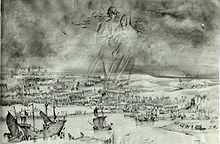The Legend of Thyl Ulenspiegel and Lamme Goedzak

The Legend of Thyl Ulenspiegel and Lamme Goedzak (French: La Légende et les Aventures héroïques, joyeuses et glorieuses d'Ulenspiegel et de Lamme Goedzak au pays de Flandres et ailleurs) is a 1867 novel by Charles De Coster. Based on the 14th century Low German figure Till Eulenspiegel, Coster's novel recounts the allegorical adventures as those of a Flemish prankster Thyl Ulenspiegel during the Reformation wars in the Netherlands.
De Coster was one of many 19th Century nationalist writers who made use of - and considerably adapted and changed - pre-existing folk tales. In this case, Thyl Ulenspiegel is made into a Protestant hero of the time of the Dutch War of Independence (or rather, of the major part played in that war by the Flemish, even though Flanders itself was doomed to remain under Spanish rule).
De Coster incorporated in his book many of the original amusing Ulenspiegel tales, side by side with far from funny material - for example, graphic depictions of tortures by the inquisition and auto de fe. As depicted by De Coster, Ulenspiegel carries in a locket around his neck the ashes of his father, burned at the stake outside of the walls of the city on charges of heresy - a feature never hinted at in any of the original folk tales. This experience begins Ulenspiegel's transformation from idle prankster to hero of the Dutch Revolt.
The novel was later illustrated with a series of linocuts by Frans Masereel, the foremost Belgian modernist painter and engraver.
A film based on the novel was filmed in 1956 with Gerard Philipe, directed by Joris Ivens and Gerard Philipe " Les aventures de Till L'Espiegle" The film was a French - East Germany co-production. " Bold Adventure " International English title.
A film based on the novel was filmed in the USSR by Aleksandr Alov and Vladimir Naumov, "The Legend of Till Ullenspiegel" (1976).[1]
Ulenspiegel was mentioned in Mikhail Bulgakov's "The Master and Margarita" as a possible prototype for the black cat character Behemoth.
Wladimir Vogel was a Russian composer who wrote a drama-oratorio Thyl Claes in the late 30s or early 40s, derived from De Coster's book.
The Soviet composer Nikolai Karetnikov and his librettist filmmaker Pavel Lungin adapted De Coster's novel as the samizdat opera "Till Eulenspiegel" (1983), which had to be recorded piece-by-piece in secret and received its premiere (1993) only after the Soviet Union collapsed.
See also
References
- ↑ Legenda o Tile (1979), IMDB.com
2. ^ Bold Adventure (1956). IMDB com.